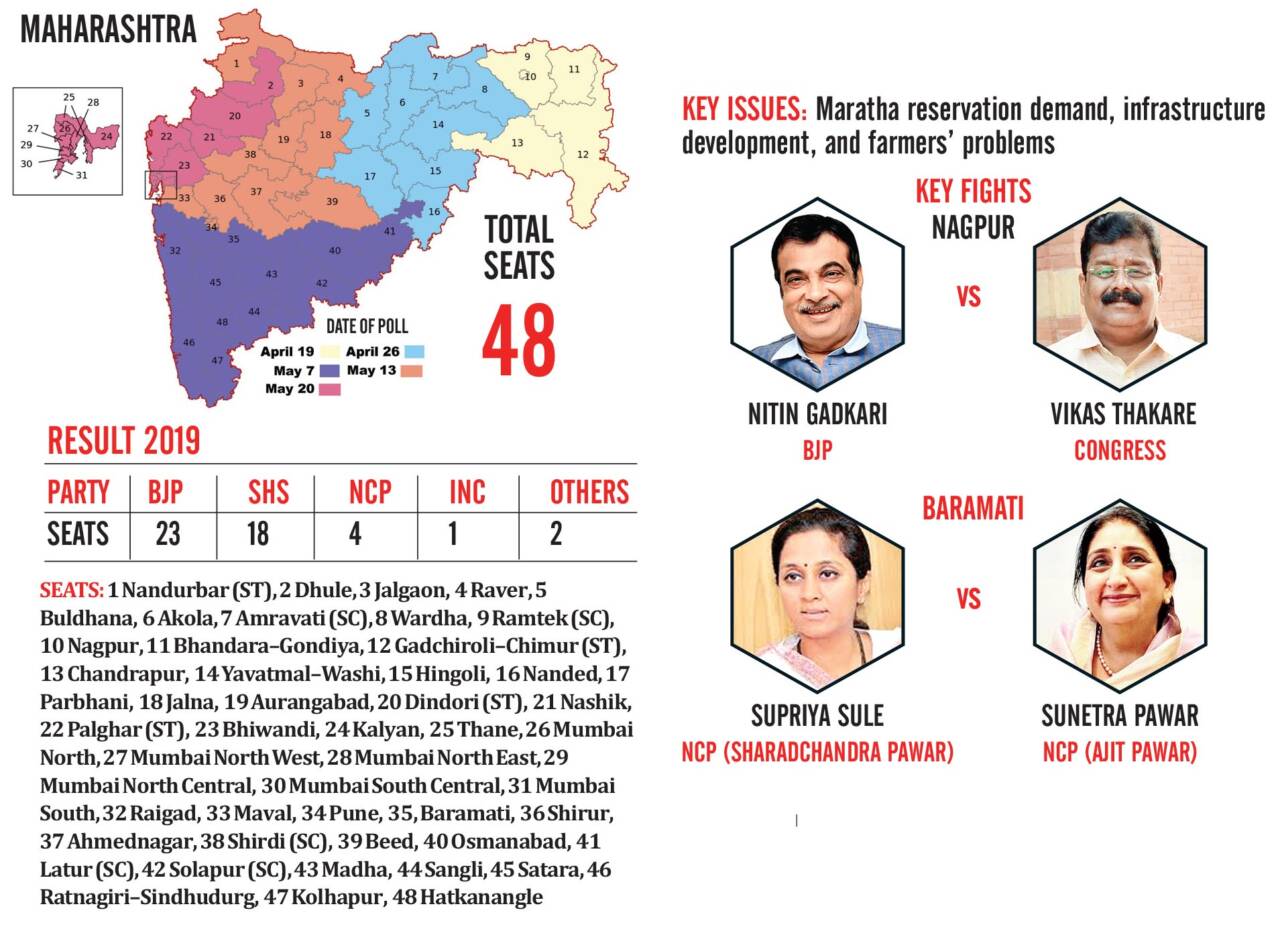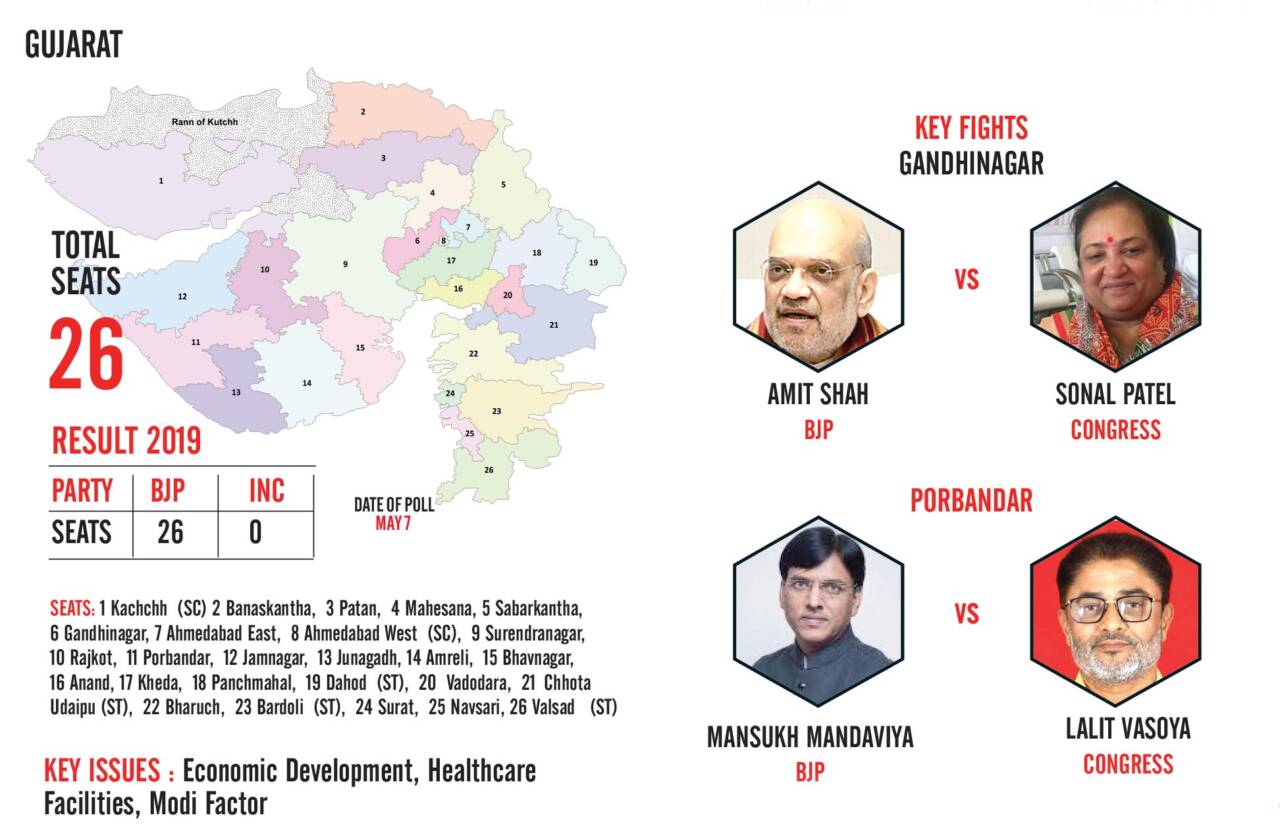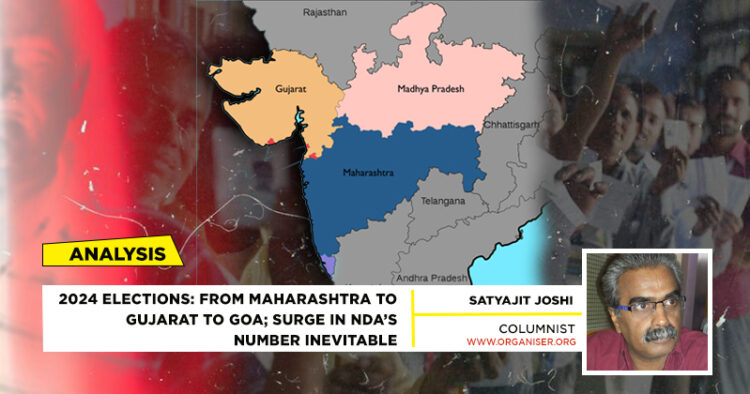Thackerays and Pawars have been dominating Maharashtra politics for five decades. Both the parties are currently crippled with split, which always happens in dynastic politics. Crucial test for the Mahayuti alliance is whether Maharashtra will get liberated from dynastic politics, which always stands for family first. BJP’s slogan – Nation first – has posed a serious challenge before family-run parties in Maharashtra.
BJP is raising the issue of Dynasty poltics saying that all the decisions taken by Sharad Pawar and Uddhav Thackeray are for their own families and not for the people

Decline Seems Inevitable
Eighty four-year-old Sharad Pawar, who nourished the ambition of becoming Prime Minister, is forced to visit hamlets in his own Baramati Lok Sabha constituency to campaign for her daughter Supriya Sule. His party is contesting in only ten seats out of 48 in Maharashtra. It has reduced NCP (Shararchandra Pawar) as the third junior most partner in Maharashtra Vikas Aghadi (MVA). Uddhav Thackeray is forced to outsource Leftist intellectuals and activists to push his agenda. All the Left parties were welcomed by Uddhav Thackeray at the party office when MVA announced its seat sharing. Uddhav’s commitment for Hindutva is restricted only at verbal level. In several constituencies, Shiv Sena (UBT) has no cadre to fight the election as all of them have deserted him. Pawar and Thackeray families are fighting for their political survival in the current Lok Sabha elections. Both the families have been dominating Maharashtra politics for the past few decades but their decline seems inevitable as both the parties are gripped with the ills of dynastic politics. In the past two years, NCP and Shiv Sena witnessed serious splits mainly because of inbuilt restrictions of dynastic politics. Uddhav Thackeray was isolated as he chose to promote his son Aaditya instead of die-hard leader Eknath Shinde. Sharad Pawar opted for his daughter Supriya Sule as his heir, forcing his nephew to rebel against uncle. In the process, both Pawar and Thackeray families have lost their earlier standing. Gram Panchayat elections, held last year, have shown that voters have rejected Pawar and Thackeray families. Congress had a good opportunity to fill the vacuum, caused by splits in Sharad Pawar camp and Shiv Sena. Congress continues to have some pockets in Maharashtra but party leadership exhibited its intellectual bankruptcy by surrendering before Uddhav Thackeray. In absence of confidence, Congress is fighting for only 17 seats out of 48 as MVA partner. Congress cadre is highly disappointed and angry as they fear that the party would be wiped out from Maharashtra because of this blunder. Several of its leaders are joining either BJP or Shiv Sena as they have lost all their hopes. Experience in Bharatiya politics suggests that dynastic political parties head for a decaying process from the third generation. Such examples are the Nehru-Gandhi family, Mulayam family, Karunanidhi family and Lalu Yadav family. The process of decline starts from the second generation and it gets accelerated from the third generation. Decline happens rapidly or much earlier if the political heir is not capable enough to run the so-called legacy. Maharashtra is passing through this political situation when it comes to Pawar or Thackeray family. Sharad Pawar’s fourth generation is in active politics. (Sharad Pawar’s mother was active in politics with the Peasants and Workers Party). Currently, four members of the Pawar family are elected representatives, and many others are waiting in the wings. NCP, for all practical reasons, is a dynastic party as it is run by a family or family head. Same is the case with the Thackeray family. Balasaheb Thackeray founded Shiv Sena and Uddhav led it after his demise. Aditya was launched by none other than Balasaheb, while Uddhav is also waiting for the right opportunity to launch another son Tejas. Pawar and Thackeray families are struggling for political survival when they are with either third or fourth generation. Both Shiv Sena and NCP are being run like a family-run private limited company, which eventually face domestic differences over running the company. Eknath Shinde rebelled against Uddhav because Thackerays were promoting Aditya, neglecting merits of other leaders. Sharad Pawar, on the other hand, promoted his daughter – Supriya Sule, ignoring the claim of his nephew – Ajit Pawar. This was happening for a long time, forcing Ajit to revolt against his own uncle. Pawar and Thackeray families are not in mood to read the writing on the wall. In fact, both the families continue to glorify and support the role of their forefathers, when the new generation is not willing to connect itself with them. BJP leaders are focusing on the limitations of dynastic politics. Maharashtra has a political party, BJP, which says ‘Nation first” and also two parties which say “Family first”. BJP is targeting both the parties saying that all the decisions taken by Sharad Pawar and Uddhav Thackeray are for their own families and not for the people. In fact, BJP and Shiv Sena have made it an election point that Pawar and Thackeray came together to form the Government to protect their family interests. BJP is reminding the voters that Uddhav Thackray betrayed BJP and Hindutva to form the Government with the parties, which are known as anti-Hindu. This is underlined as MVA rallies are now attended by leaders of Communists, Samajwadi Party and other known anti-Hindu forces. Mahayuti, comprising BJP, Shiv Sena (Eknath Shinde) and NCP (Ajit Pawar) is very strong on paper. The biggest challenge before Mahayuti is to translate this strength into votes. Mahayuti has set the goal of winning 45 seats out of 48. Three parties are banking on the popularity of Prime Minister Narendra Modi by focusing on his various achievements. The biggest asset for Mahayuti is Devendra Fadnavis, who has emerged as the most successful strategist in Maharashtra politics. While Fadnavis has successfully managed to bridge the gaps in three partners of Mahayuti, MVA is unable to end internal differences. Congress and NCP (Sharad Pawar) are upset by the dominance of Sena in seat distribution. Many Congress leaders attribute this situation to state leaders as they feel that Uddhav Thackeray was the most affected leader by split and should have shown some restraint in seat sharing. Congress leaders’ mood was palpable when leaders of three parties preferred to wind up a press conference when seat sharing was announced. MVA received the most severe jolt when it failed to accommodate Prakash Ambedkar-led Vanchit Bahujan Aghadi (VBA). In fact, treatment meted out to representatives of VBA by Uddhav Thackeray’s Sena, Sharad Pawar’s NCP and Congress has angered followers of Ambedkar. They are nurturing a deep sense of humiliation, which is bound to reflect in the voting.
All the Left parties were welcomed by Uddhav Thackeray at the party office when MVA announced its seat sharing. Uddhav’s commitment for Hindutva is restricted only at verbal level

No Challenge for Saffron in Gujarat
In neighbouring Gujarat, BJP continues to be unchallenged. Congress and AAP are trying to pose a combined challenge but only curiosity is whether BJP will be able to win all 26 Lok Sabha seats for the third consecutive time. Being the home State of Prime Minister Narendra Modi and Home Minister Amit Shah, BJP has set a target of establishing lead in all the booths, which is an indicator of confidence of BJP. BJP has won 156 Assembly seats out of 182 in the 2022 election. This was the highest performance of BJP three years back. AAP is yet to recover from the shock of Arvind Kejriwal’s arrest while Congress is yet to finalise candidates, which is an indicator of the party’s pathetic condition.

In Goa, the real challenge for BJP is to capture South Goa seat, where Congress won in 2019. BJP has fielded Pallavi Shrinivas Dempo against Viriato Fernandes. BJP is focusing on this seat as it had lost this seat with a short margin. From North Goa, BJP had fielded Union Minister Shripad Naik, whose victory is considered as a mere formality.


















Comments